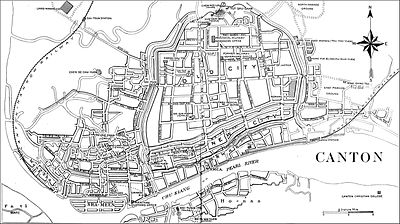Canton Coup
| Canton Coup | ||
|---|---|---|
Hanyu Pinyin | Sān-Èr-Líng Shìjiàn | |



The Canton Coup
History
Background
At the time of the incident, the
Incident

The
In his subsequent reports, Chiang stated that he became alarmed when the ship's commander claimed to be acting on orders from him, which he had never given.
On 20 March 1926 Chiang declared martial law
Wang Jingwei, who had a high fever at the time, was visited by Chen Gongbo; Tan Yankai, head of the 2nd Corps; Zhu Peide (3rd Corps); Li Jishen (4th Corps); and T. V. Soong, the minister of finance. Wang was indignant and some of the others felt Chiang was overreacting, but the Nationalist Executive Committee convened at the house on 22 March and a compromise was reached in which Wang would take a vacation abroad in the near future.[8]
Aftermath
The Canton Coup effectively ended the efforts of the Chinese Communists and Soviets to undermine the Nationalists through steady work to strengthen the party's left wing at the expense of its right.
On 7 April Wang Jingwei resigned his posts and announced he would travel abroad;[11] he left for France secretly on May 11.[12] Bubnov was recalled to Russia the same month.[13] Wang finally returned in April of the next year, invited by Borodin to counter Chiang's success.[8] Zhou Enlai, removed from his posts in Guangzhou, travelled to Shanghai, where he organized strikes by hundreds of thousands of factory workers in February and March 1927.[14]
Controversy
The Communists denied that there was any plot against Chiang Kai-shek and claimed that his actions were simply intended to remove the left-wing Wang Jingwei from influence over the National Revolutionary Army and over Guangzhou's important military academy.[1]
Historians disagree on whether the incident was plotted by Chiang Kai-shek;[6][n 2] a Communist plot to kidnap him and remove him to Vladivostok;[6] or the whole affair was merely "a series of miscommunications, misunderstandings, faulty telephone connections and personal rivalries among junior staff".[4]
See also
Notes
- ^ Among Sun's many names, "Zhongshan" is the most popular within China.
- ^ Zhang Qianwu has gone so far as questioning whether Li was even the captain of the Zhongshan and argued from surviving records that Li's "orders" were forgeries and that the actual commander was Zhang Chentong.[15]
References
Citations
- ^ a b c d e f g Wortzel (1999), "Canton Coup".
- ^ a b Felber (2002), p. 57.
- ^ a b c Van de Ven (2003), p. 101.
- ^ a b Van de Ven (2003), p. 102.
- ^ a b c d Van de Ven (2003), p. 103.
- ^ a b c d e f Ah Xiang (1998), p. 1.
- ^ Felber (2002), p. 58.
- ^ a b c Ah Xiang (1998), p. 2.
- ^ Leutner (2006), p. 49.
- ^ Felber (2002), p. 60.
- ^ a b Van de Ven (2003), p. 104.
- ^ a b c d Ah Xiang (1998), p. 3.
- ^ BDC (1986), "Andrei Bubnov".
- ^ Ah Xiang (1998), p. 4.
- ^ Zhang (2005).
Sources
- Biographical Dictionary of the Comintern, Hoover Publication No. 340, Stanford: Hoover Institution Press, 1986, ISBN 9780817984038.
- Ah Xiang (1998), "The Zhongshan Warship Incident" (PDF), Tragedy of Chinese Revolution.
- Felber, Roland (2002), "A 'Bloc Within' or a 'Bloc Without'? Controversies on the CCP's attitude towards the Guomindang before and after 20 March 1926", The Chinese Revolution in the 1920s: Between Triumph and Disaster, London: RoutledgeCurzon, pp. 52–65, ISBN 9781136873102.
- Leutner, Mechthild (2006), "The Communist Party of China and the Communist Party of the Soviet Union and the Comintern in the 1920s and Early 1930s: Interactions between Cooperation and Defense", Global Conjectures: China in Transnational Perspective, Chinese History and Society, Vol. 30, Berlin: Lit, pp. 41–55, ISBN 9783825894818.
- Wortzel, Larry M. (1999), Dictionary of Contemporary Chinese Military History, ISBN 9780313293375.
- Van de Ven, Hans (2003), War and Nationalism in China: 1925–1945, Studies in the Modern History of Asia, London: RoutledgeCurzon, ISBN 978-0415145718.
- Zhang Qian-wu (February 2005), "The Truth of the Event of the Warship 'Zhongshan'", Journal of Xidian University, Social Sciences ed., archived from the original on 2018-11-26, retrieved 2013-03-26
External links
- Zhou Enlai (14–15 July 1960), "The Communist International and the Chinese Communist Party", Selected Works, vol. II, Beijing: Foreign Languages Press, pp. 306–319.
